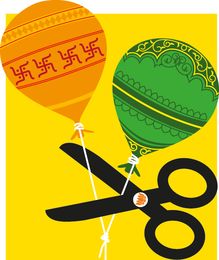As the final phases of the general elections draw to a close, an increasingly panicky Prime Minister Narendra Modi has started upping the ante on the question of reservations for Muslims, once again attempting to rebuild his majority by forcing a Hindu-Muslim divide.
If, as the BJP has long been stressing, and Modi has been underlining, religion is nowhere mentioned in the First Amendment of 1951, which brought in reservations for Other Backward Classes, it is also necessary to underline that “caste” is also nowhere mentioned in this connection. The operative word is “classes”—a point stressed by Jawaharlal Nehru moving the legislation to give effect to the recommendations of the select committee set up by Parliament. “Classes”, of course, include both castes and communities. That is why Nehru, moving the amendment on May 29, 1951, described our aim as being “to realise an egalitarian society”, given the indisputable fact and social reality that, “infinite divisions have grown up in our… social structure”. He, specifically, described these infinite divisions as relating to “the caste system or religious divisions”. The use of the words “Other Backward Classes” (OBCs) was clearly designed to address all backward groups whether of castes, or occupations, or religion.
Therefore, the Mandal Commission included a number of Muslim castes in their OBC list, as well as occupations common to Hindus and Muslims, such as butchers and barbers. Thus, right from the start, certain Muslim castes have been considered backward, the term not being regarded as exclusive to Hindu society. The issue has never been, as Modi seems to think, of whether or not Islamic theology recognises caste: Indian Muslims have always been categorised on caste lines (arzal, as the lowest). Modi implicitly recognises this when he hoots what he claims he is doing for ‘Pasmanda Muslims’. Why not reservations for them, especially as the Justices Rajindar Sachar and Ranganath Mishra commissions found that the Muslim community as a whole was almost as backward as SCs and STs and “more backward” than non-Muslim OBCs, excluding Muslims who fall in the ‘creamy layer’, as for everyone else?
The problem of including Muslim castes among OBCs has always come up against the barrier of 50 per cent being the maximum share of reservations laid down by the Supreme Court. This has proliferated the practice by states, especially the southern states of Tamil Nadu, Kerala, Andhra Pradesh, Telangana, and Karnataka, of providing Muslim sub-quotas within existing OBC quotas, thereby bringing a religion dimension into the quite different question of treating OBC reservations for backward classes of Muslims as “an extension of equality” and not an “exception to the principles of equality and non-discrimination”, as explained by Faizan Mustafa, vice-chancellor, Chanakya National Law University. This has been further confirmed in a series of Supreme Court judgments such as in Balaji (1962), Royappa (1973), and State of Kerala v/s N.M. Thomas (1975), besides the more renowned case of Indra Sawhney (1992).
To overcome the 50 per cent barrier, the Congress manifesto lays down a strategy to achieve the objective, beginning with a “caste survey” to move from “estimates” to facts on the ground. This will be the necessary preliminary to moving legislation to dismantle the 50 per cent barrier and giving OBCs of all religious persuasions a level ground to work towards removing their present educational and social backwardness, while otherwise tackling economic issues of rampant poverty and unemployment.
This is the logical way forward. Modi seeks to give this a communal colour. That may have succeeded in the past elections, but the electorate are waking up to the reality that it is not the Indian Muslim or Pakistan that is the bugbear. It is their economic and social condition after a decade of the Modi sarkar that is making them wonder whether Modi’s promised “achche din” (good days) have really arrived.
Aiyar is a former Union minister and social commentator.


